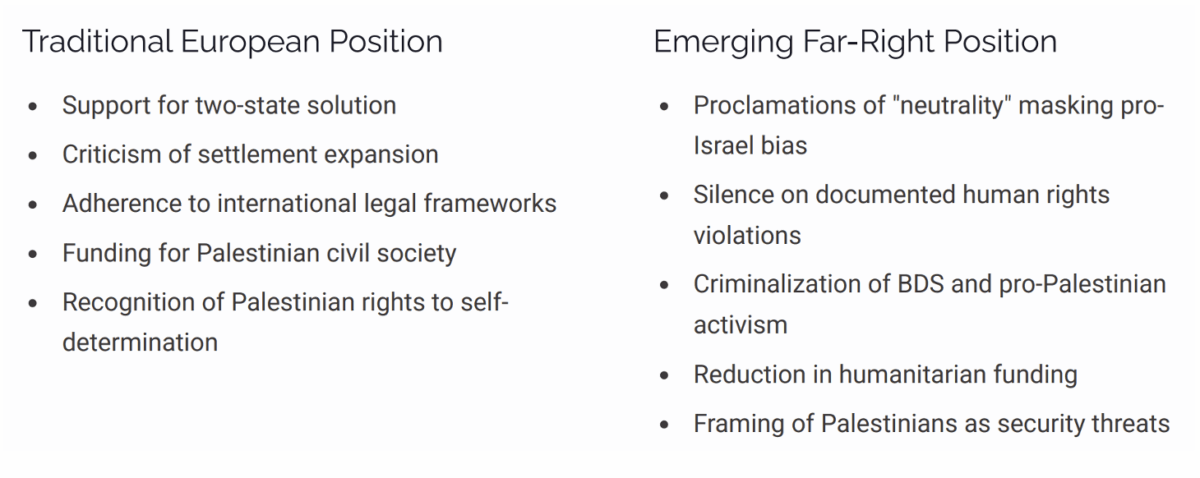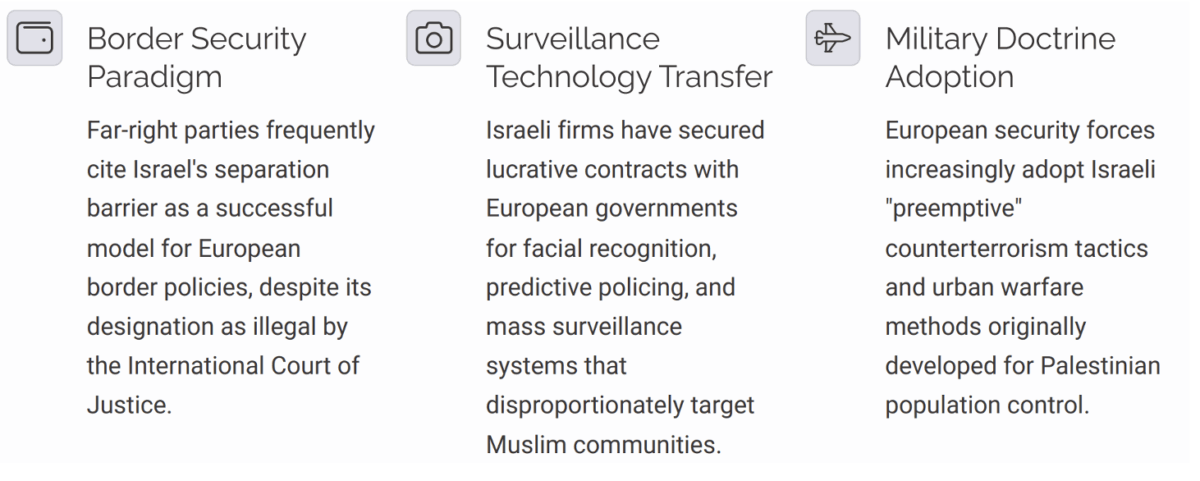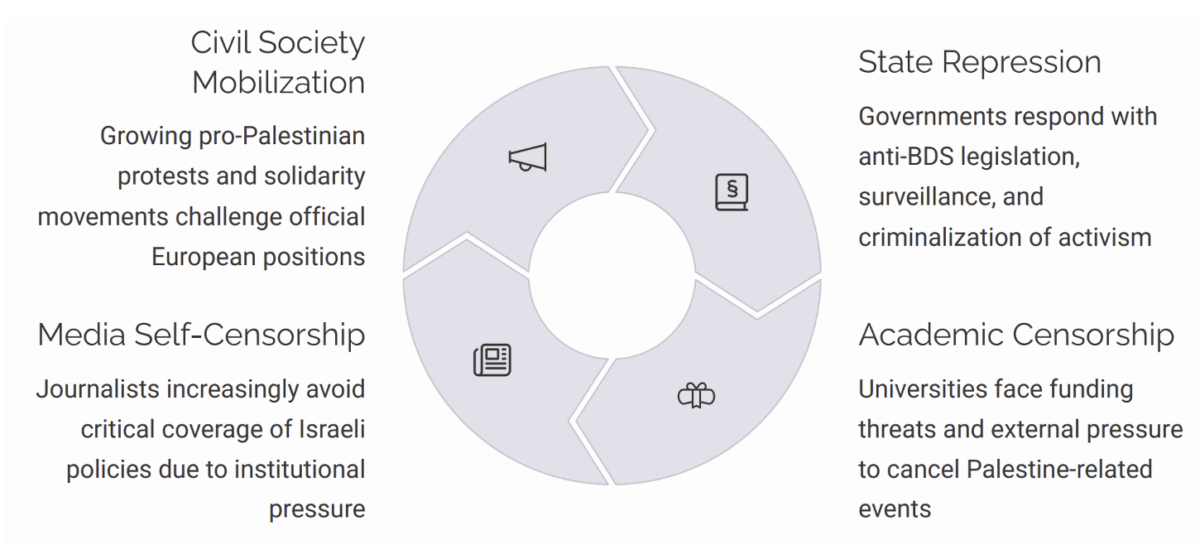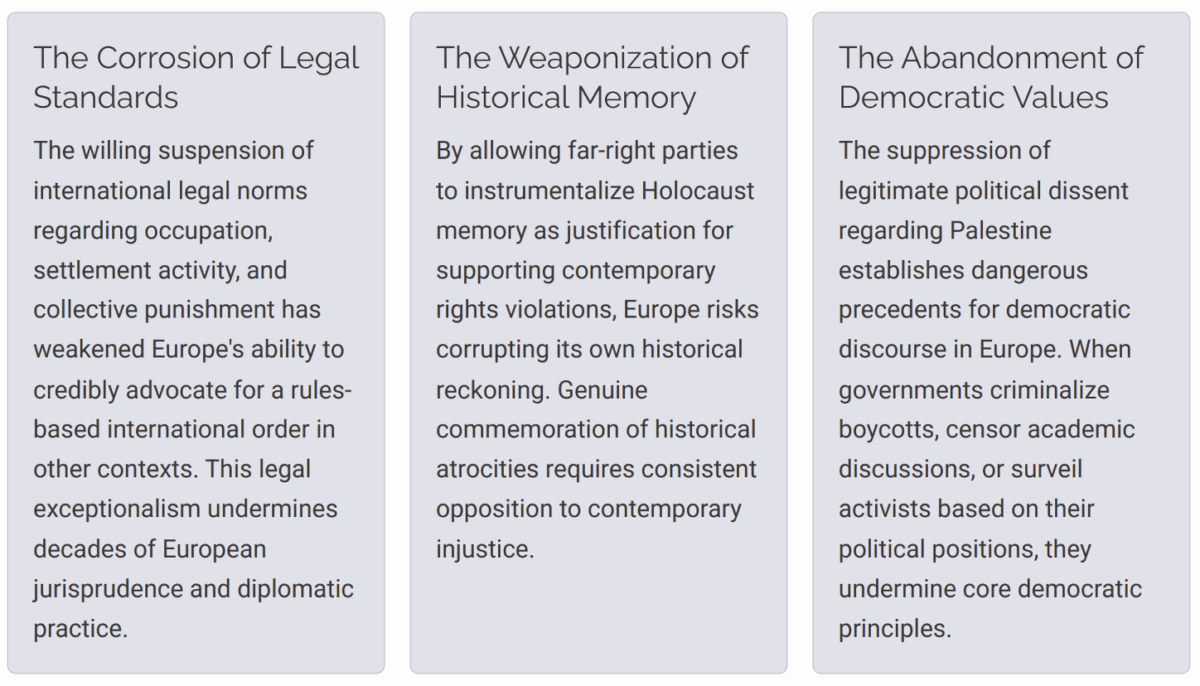Long attached to the principles of international law and human rights, Europe is now witnessing a political shift that redefines its stance on the Israeli-Palestinian conflict. Across the continent, far-right parties once known for their antisemitic rhetoric are forging close ties with Israel, turning the Palestinian question into a fault line of ideological realignment. In this new configuration, solidarity with Israel becomes a symbol of civilizational allegiance, while support for Palestinian rights is increasingly framed as subversive or extremist. Behind the façade of neutrality, this alliance blurs historical responsibility, corrodes democratic values, and weakens Europe’s moral authority on the global stage.
European engagement with the Israeli-Palestinian conflict has historically been characterized by a principled approach grounded in international law, human rights standards, and advocacy for a two-state solution. For decades, the European Union and individual European states maintained a position of “critical engagement” with Israel, condemning settlement expansion, supporting Palestinian institution-building, and consistently reaffirming Palestinian rights to self-determination. This approach reflected Europe’s post-World War II commitment to a rules-based international order and the continent’s own complicated colonial history in the Middle East.
However, the rise of populist and far-right movements across Europe has precipitated a profound shift in this diplomatic stance. European discourse has increasingly adopted a posture of proclaimed “neutrality” that effectively silences criticism of Israeli military actions and occupation policies. This transformation is evident in multiple policy domains: from the refusal to condemn documented war crimes to the aggressive criminalization of the Boycott, Divestment, and Sanctions (BDS) movement in countries like Germany and France. Far-right parties that have gained power in countries like Italy and Hungary have championed this realignment, often framing it as a rejection of “biased” traditional diplomacy.
Perhaps most troubling is the systematic erasure of rights-based language from European diplomatic discourse. Terms like “colonization,” “occupation,” and “apartheid”—once employed by European diplomats and scholars to analyze the structural conditions in Palestine—have been gradually replaced with depoliticized frameworks emphasizing “complex conflict,” “religious tensions,” or “security challenges.” This linguistic shift represents more than semantic preference; it constitutes a fundamental reconfiguration of how Europe understands its relationship to the conflict, increasingly adopting Israeli narrative frames while marginalizing Palestinian perspectives.
The seemingly contradictory alliance between Israel and European far-right parties—many with historical ties to antisemitism—becomes coherent when examined through the lens of shared ideological commitments and strategic interests. At the center of this convergence lies a mutual investment in securitization frameworks and anti-Muslim sentiment that transcends historical tensions between these political actors.
For European far-right movements, Israel represents an aspirational model for securitization policies. The Israeli security apparatus—with its sophisticated surveillance systems, border walls, biometric identification protocols, and preemptive strike doctrines—offers a template for the far-right’s vision of “defending” European civilization against perceived external threats. Parties like Italy’s Lega, Hungary’s Fidesz, and Austria’s Freedom Party explicitly reference Israeli security policies as justification for their own anti-immigration agendas. The material dimension of this alliance is substantial: Israel has become a significant exporter of security technologies to European countries with far-right governments, creating economic incentives for continued partnership.
Islamophobia functions as the ideological binding agent in this alliance. Both Israeli right-wing politicians and European far-right leaders frame their political projects in terms of defending “Judeo-Christian civilization” against what they characterize as Islamic extremism and demographic threats. This shared narrative conveniently glosses over the European far-right’s historical antisemitism, recasting Jews and the Jewish state as allies in a civilizational struggle against Islam. For Israel’s government, this partnership offers diplomatic cover against international criticism, while for European far-right parties, alignment with Israel provides a shield against accusations of antisemitism.
Perhaps most disturbing is the historical revisionism that underpins this alliance. Far-right European parties have engaged in sophisticated forms of Holocaust inversion—claiming that Muslims represent the “new Nazis”—while simultaneously downplaying or denying the Nakba (the mass displacement of Palestinians in 1948). This selective approach to historical memory allows for the construction of narratives in which supporting Israel becomes equated with honoring Holocaust victims, while Palestinian displacement and suffering are rendered invisible or dismissed as propaganda.
The realignment of European policy toward uncritical support for Israel has triggered profound political consequences, both within Europe and in its relations with the broader international community. As far-right parties have gained influence in setting the terms of European engagement with the Israeli-Palestinian conflict, the political costs of this shift have become increasingly apparent across multiple domains.
European civil society has responded to this diplomatic realignment with unprecedented mobilization. Pro-Palestinian demonstrations have drawn hundreds of thousands of participants across major European cities, reflecting a growing disconnect between government policies and public opinion. However, these expressions of solidarity have been met with increasingly repressive measures. Academic conferences on Palestine have been canceled under governmental pressure, pro-Palestinian student groups have faced surveillance and harassment, and peaceful BDS activists have been criminally prosecuted in several European countries. This securitized response to legitimate political expression raises serious concerns about democratic erosion and the criminalization of dissent.
On the international stage, Europe’s credibility in the Arab world and Global South has suffered significant damage. The continent’s historical positioning as a balanced mediator between Israelis and Palestinians has given way to a perception that Europe has abandoned its commitment to international law when politically expedient. This erosion of trust has undermined European diplomatic initiatives beyond the Middle East, weakening the continent’s influence in multilateral forums and reinforcing narratives of Western hypocrisy regarding human rights standards. Arab and Muslim-majority countries increasingly view European positions as indistinguishable from American unilateral support for Israel.
Perhaps most concerning are the domestic democratic costs of this alliance. The securitarian logic that justifies repression of Palestinians has been imported into European political systems, expanding surveillance authorities, restricting free expression, and normalizing exceptional legal measures against Muslim citizens and Palestine solidarity activists. The conflation of legitimate criticism of Israeli policies with antisemitism has poisoned democratic debate, while empowering precisely those far-right forces that have historically threatened both Jewish and Muslim communities in Europe.
The alliance between European far-right movements and Israel represents more than a tactical political maneuver—it constitutes a fundamental reconfiguration of European identity politics with profound implications for international law, human rights, and democratic governance. As this relationship continues to shape European policy toward Palestine, we must critically assess the long-term consequences of a foreign policy increasingly driven by ideological alignment rather than legal principles.
The normalization of exceptional measures against Palestinian rights and their advocates within Europe has established troubling precedents that extend beyond this specific conflict. When European governments justify the suspension of normal legal protections, academic freedom, or free expression rights in the context of Palestine, they create legal and discursive frameworks that can be deployed against other marginalized communities. The securitization logic that frames Palestinians exclusively as potential threats rather than rights-bearing subjects has already begun to inform European approaches to migration, religious freedom, and counterterrorism more broadly.
Europe’s conspicuous silence on Palestinian rights has itself become a powerful political statement. This silence reflects not neutrality but active complicity in the maintenance of structural violence and dispossession. The continent that once claimed to have learned the lessons of its own colonial history now finds itself reinforcing colonial logics in its engagement with Palestine—a profound moral contradiction that demands reckoning.
Moving forward, rebuilding democratic and postcolonial solidarities requires Europeans to challenge the far-right’s monopolization of the discourse on Israel-Palestine. This means recommitting to consistent application of international law, protecting spaces for Palestinian narratives and perspectives, and recognizing that genuine security for all peoples in the region depends on justice rather than militarization. Most urgently, it requires Europeans to recognize that the alliance between far-right movements and Israel threatens not only Palestinian rights but the very democratic and humanistic values that Europe claims to embody.
Figure 1 Comparative Table of European Positions on Palestine: Traditional vs Far-Right Shift.

Figure 2 The Logic of Convergence.

Figure 3 Europe and the Palestinian Cause: Between Mobilization and Silencing.

Figure 4 From Rule of Law to Rule by Exception: Europe’s Palestinian Paradox.

Further Reading on E-International Relations

